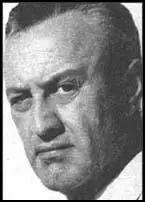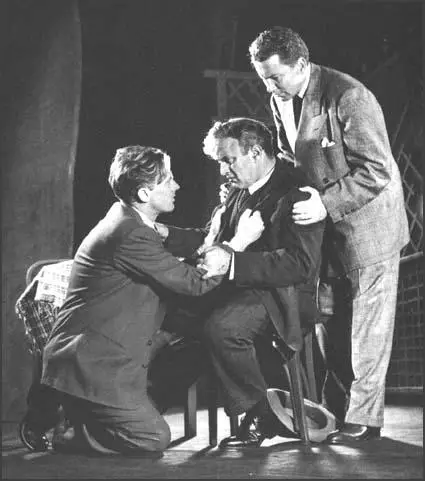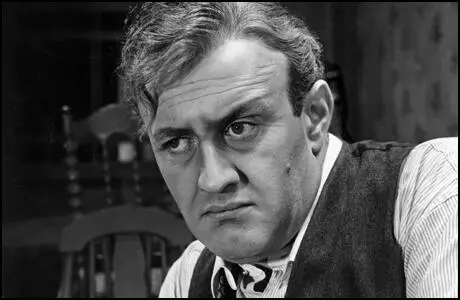Lee J. Cobb

Lee J. Cobb was born in New York on 8th December, 1911. He studied at New York University before joining the Group Theatre in 1935 where he appeared with Elia Kazan in Waiting for Lefty, the highly successful play by Clifford Odets. He made his screen debut in The Vanishing Shadow (1934). This was followed by North of the Rio Grande (1937), Ali Baba Goes to Town (1937) and Golden Boy (1938).
Cobb became an established film star and appeared in The Song of Bernadette (1943), Winged Victory (1944), Anna and the King of Siam (1946), Johnny O'Clock (1947), Boomerang! (1947) and Captain from Castile (1947).
In 1947 Cobb played the lead role of Willy Loman in Death Of A Salesman, a play written by Arthur Miller and directed by Elia Kazan. The play opened at the Morosco Theatre on 10th February, 1949. It also featured Mildred Dunnock (Linda), Arthur Kennedy (Biff) and Cameron Mitchell (Happy).
Death Of A Salesman played for 742 performances and won the Tony Award for best play, supporting actor, author, producer and director. It also won the Pulitzer Prize for Drama and the New York Drama Critics' Circle Award for Best Play. Arthur Miller was himself highly critical of the play: "I knew nothing of Brecht then or of any other theory of theatrical distancing: I simply felt that there was too much identification with Willy, too much weeping, and that the play's ironies were being dimmed out by all this empathy."

In 1947 the House of Un-American Activities Committee (HUAC) began an investigation into the Hollywood Motion Picture Industry. The HUAC interviewed 41 people who were working in Hollywood. These people attended voluntarily and became known as "friendly witnesses". During their interviews they named several people who they accused of holding left-wing views.
One of those named, Bertolt Brecht, an emigrant playwright, gave evidence and then left for East Germany. Ten others: Herbert Biberman, Lester Cole, Albert Maltz, Adrian Scott, Samuel Ornitz,, Dalton Trumbo, Edward Dmytryk, Ring Lardner Jr., John Howard Lawson and Alvah Bessie refused to answer any questions.
Known as the Hollywood Ten, they claimed that the 1st Amendment of the United States Constitution gave them the right to do this. The House of Un-American Activities Committee and the courts during appeals disagreed and all were found guilty of contempt of congress and each was sentenced to between six and twelve months in prison.
Others called before the HUAC were willing to testify and Cobb was named by Larry Parks in 1951. For two years he refused to appear but in 1953 he changed his mind and named twenty people as former members of the Communist Party. He later explained why: "The HUAC did a deal with me. I was pretty much worn down. I had no money. I couldn't borrow. I had the expenses of taking care of the children. Why am I subjecting my loved ones to this? If it's worth dying for, and I am just as idealistic as the next fellow. But I decided it wasn't worth dying for, and if this gesture was the way of getting out of the penitentiary I'd do it. I had to be employable again."
Arthur Miller, who refused to give evidence against former friends recalled: "I could not help thinking of Lee Cobb, my first Willy Loman, as more a pathetic victim than a villain, a big blundering actor who simply wanted to act, had never put in for heroism, and was one of the best proofs I knew of the Committee's pointless brutality toward artists. Lee, as political as my foot, was simply one more dust speck swept up in the thirties idealization of the Soviets, which the Depression's disillusionment had brought on all over the West."

After giving evidence to the House of Un-American Activities Committee Cobb was free to return to acting in Hollywood. He worked with Elia Kazan and Budd Schulberg, two others who named names, on the Academy Award winning film, On the Waterfront (1954).
Other films made by Cobb include The Left Hand of God (1955), The Man in the Gray Flannel Suit (1956), Twelve Angry Men (1957), The Three Faces of Eve (1957), The Brothers Karamazov (1958), Exodus (1960), How the West Was Won (1962), Coogan's Bluff (1968) and The Exorcist (1973).
Lee J. Cobb died on 11th February, 1976, at his home in Woodland Hills, California.
Primary Sources
(1) Lee J. Cobb was interviewed by Victor Navasky when he was writing his book, Naming Names (1982)
When the facilities of the government of the United States are drawn on an individual it can be terrifying. The blacklist is just the opening gambit - being deprived of work. Your passport is confiscated. That's minor. But not being able to move without being tailed is something else. After a certain point it grows to implied as well as articulated threats, and people succumb. My wife did, and she was institutionalized. In 1953 the HUCA did a deal with me. I was pretty much worn down. I had no money. I couldn't borrow. I had the expenses of taking care of the children. Why am I subjecting my loved ones to this? If it's worth dying for, and I am just as idealistic as the next fellow. But I decided it wasn't worth dying for, and if this gesture was the way of getting out of the penitentiary I'd do it. I had to be employable again.
(2) In his testimony before the House of Un-American Activities Committee Lee J. Cobb explained that he endorsed its right to investigate the Communist Party (23rd June, 1953).
I would like to thank you for the privilege of setting the record straight, not only for whatever subjective relief it affords me, but if belatedly this information can be of any value in the further strengthening of our Government and its efforts at home as well as abroad, it will serve in some way to mitigate whatever feeling of guilt I might have for having waited this long.
(3) Arthur Miller, Timebends - A Life (1987)
I could not help thinking of Lee Cobb, my first Willy Loman, as more a pathetic victim than a villain, a big blundering actor who simply wanted to act, had never put in for heroism, and was one of the best proofs I knew of the Committee's pointless brutality toward artists. Lee, as political as my foot, was simply one more dust speck swept up in the thirties idealization of the Soviets, which the Depression's disillusionment had brought on all over the West.

